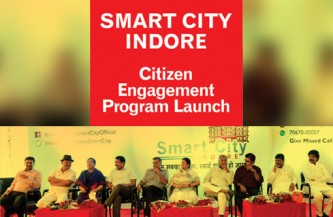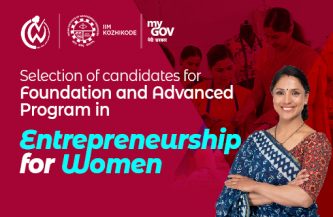Formulating the New Education Policy

A collaborative, multi-stakeholder approach to national policy formulation
On January 26th 2015, the Ministry of Human Resource Development initiated the process of formulating the New Education Policy (NEP) to meet the changing dynamics of the population’s requirements with regard to quality education, innovation and research, aiming to making India a knowledge superpower by equipping its students with the necessary skills and knowledge and to eliminate the shortage of manpower in science, technology, academics and industry.
Unlike the past where the consultative processes have depended on a top-down approach which involved a few experts, the current NEP consultations is undertaking an extensive, time-bound, participatory bottom-up approach.
Celebrating the true spirit of democracy, citizens, parents, teachers, administrators, field practitioners, industry, academicians and experts, from across the country, have been invited to actively engage in the policy development process. 33 themes have been identified to ensure focused deliberations. The Government’s citizen engagement platform, MyGov, has played a critical role in enabling the inclusive consultations.
In February, earlier this year, I convened a meeting of representatives of various ministries of the Government of India, inviting suggestions for devising curriculum from their perspective as well as providing inputs in terms of employability and manpower requirements. In March, consultations were held with state education ministers and state education secretaries to discuss the consultation process for the formulation of the NEP, in New Delhi. The NEP consultations were also extensively discussed during the CABE meeting in August. This was followed by six zonal meetings in September- October which were attended by Education Ministers and officials of the respective States/ UTs. I have also had the opportunity to directly interact with district collectors and sarpanches across the Nation through video conference.
Additionally, various central and state institutions, including UGC, AICTE, Association of Indian Universities (AIU), NCERT, CBSE, the Indian Institute of Advanced Studies (IIAS)-Shimla, Indira Gandhi Open University, Maulana Azad National Urdu University- Hyderabad, Central University of Gujarat, NLMA, Central University of Rajasthan, NUEPA, Central University of Sikkim and National Council for Teach Education, have held national thematic workshops.
The extensive grassroots consultations, which included deliberations by village education committees across 2.5 lakh gram panchayats along with multi-stakeholder meetings in blocks, districts and urban bodies/municipalities, commenced in June 2015. Parents, students, teachers, elected officials, administrators, members of civil society and citizens have actively participated in these meetings, which addressed issues across the 33 themes. Based on the consultation reports, State teams have held state consultations and are in the final stages of submitting their reports to the Centre.
The team at MyGov has created an online consultation module, which enabled the upload of reports/recommendation after each consultative meeting. I am happy to report that as on 26th November 2015, 1,00,421 villages, 5155 blocks, 1201 ULBs, 573 districts and 11 states have already uploaded their recommendations on their aspirations for education in our country.
To further support offline consultations, online comments and suggestions were invited across platforms. Over 29000 citizens have submitted recommendations on MyGov.in. Field practitioners have participated in the online consultation process through UN Solutions Exchange (a knowledge management initiative of the UN). Over 15000 students have submitted their suggestions on education in India through CBSE’s portal. Further, UNESCO and the Mahatma Gandhi Institute for Education for Peace, Sustainable Developmenthas undertaken a youth survey on the National Education Policy.
The mammoth task of engaging with citizens from all corners of the country has required cooperation and coordination across all political parties, state governments, civil society members and institutions. State Education Ministers, state education secretaries and district Collectors are leading the efforts in their jurisdictions. In addition, 2.5+ lakh executive officers of local bodies are also directly involved in the process.
Technology has played a critical role in streamlining the process and ensuring transparency. In fact, the logo, slogan, and tagline for the NEP were finalised through an online competition on MyGov. In order to facilitate continued engagement with citizens, a dedicated website has been launched for the NEP, as a one stop portal for all information related to the consultations. To provide full technical support, the consultations have leveraged state information officers (SIOs) from all 36 States/ UTs as well as the district information officers (DIOs) from all 650+ districts in India.
Currently, the Committee for Evolution of the New Education Policy, which includes Shri T.S.R. Subramanian, Former Cabinet Secretary (Chairman); Smt. Shailaja Chandra, former Chief Secretary, NCT of Delhi; Shri Sevaram Sharma, former Home Secretary, NCT of Delhi; Shri Sudhir Mankad, former Chief Secretary, Gujarat, and Prof. J S Rajput, former Director, NCERT, is in the process of drafting the National Education Policy along with a Framework for Action (FFA). The National University of Educational Planning and Administration (NUEPA), New Delhi will assist the Committee, and perform the functions of a Secretariat to the Committee.
For the first time in independent India, citizens have been given the opportunity to actively participate in formulating a national policy along with experts. It is my conviction that only when the National Education Policy reflects the aspirations of all our citizens, will India be able to become a true knowledge super power.
Smriti Zubin Irani is Union Cabinet Minister for Human Resource Development

















